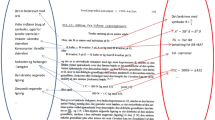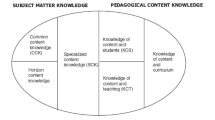Abstract
‘Teachers must know the subject they teach. Indeed, there may be nothing more foundational to teacher competency’ (Ball et al. in Journal of Teacher Education 59:389–407, 2008). In this article, the complex relationship between mathematics, mathematics for teaching, and pedagogy is explored, together with implications for teacher education programmes in Canada.
Résumé
« Les enseignants doivent connaître la matière qu’ils enseignent. En effet, il n’y a peut-être rien de plus fondamental pour la compétence des enseignants» (Ball et al. in Journal of Teacher Education 59:389–407, 2008). Dans cet article, on explore la relation complexe qui existe entre les mathématiques, le rôle que joue cette matière dans son enseignement et la pédagogie, ainsi que les implications qu’a cette relation sur les programmes de formation des enseignants au Canada.
Similar content being viewed by others
Notes
A teachers college, formerly known as normal school, is a post-secondary educational institution dedicated to the training and professional development of teachers—teaching teachers how to teach. Originating in France, these institutions were established to provide specialised educational programme for those learning to become teachers. Many teachers colleges today have been amalgamated into universities and colleges to form departments of education. (New World Encyclopedia).
References
Ball, D. L. & Bass, H. (2000). Bridging practices: Intertwining content and pedagogy in teaching and learning to teach. Journal of Teacher Education, 51(3). pp. 241 – 247. https://doi.org/10.1177/00224871000510030
Ball, D. L., Thames, M. H., & Phelps, G. (2008). Content knowledge for teaching what makes it special? Journal of Teacher Education, 59(5), 389-407.
Baumert, J., Kunter, M., Blum, W., Brunner, M., Voss, T., Jordan, A. Klusmann, U., Krauss, S., Neubrand, M., & Tsai, Y. (2010). Teachers’ mathematical knowledge, cognitive activation in the classroom, and student progress. American Educational Research Journal, 47(1), p. 33-180.
Drake, G., Walsh, K., Pomerance, L. & Rickenbrode, R. (2018) 2018 Teacher Prep Review. National Council on Teacher Quality, Washington, DC.
Hart, L., Oesterle, S., Swars, S. & Kajander, A. (Eds.). (2016). The mathematics education of elementary teachers: Issues and strategies for content courses. Charlotte, NC: Information Age Publishing.
Hill, H. C., & Ball, D. L. (2004). Learning mathematics for teaching: Results from California’s mathematics professional development institutes. Journal for Research in Mathematics Education, 35(5), 330–351;
Hill, H. C., Rowan, B., & Ball, D. L. (2005). Effects of teachers’ mathematical knowledge for teaching on student achievement. American Educational Research Journal, 42(2), 371–406.
Holm, J. & Kajander, A. (2020). Seeking intersections: Math degrees, beliefs, and elementary teacher knowledge. Canadian Journal of Science, Mathematics and Technology Education, 20(1), 27-41. https://doi.org/10.1007/s42330-019-00069-3
Kajander. A. (2010). Mathematics teacher preparation in an era of curriculum change: The development of mathematics for teaching. Canadian Journal of Education. 33(1), 228-255.
Kajander, A. (2023). Mathematics for intermediate teachers: From models to methods. Newcastle upon Tyne, United Kingdom: Cambridge Scholars Press.
Kajander, A. and Boland, T. (2014). Mathematical models for teaching: Reasoning without memorization. Toronto, ON: Canadian Scholars’ Press.
Kajander, A., & Holm, J. (2016). What math matters? Types of mathematics knowledge and relationships to methods course performance. Canadian Journal of Science, Mathematics and Technology Education, 16(3), 273-283. DOI: https://doi.org/10.1080/14926156.2016.1183837.
Kajander, A., Kotsopoulos, D., Martinovic, D., & Whiteley, W. (2013). Mathematics pre-service teacher education in Ontario: Consultation brief regarding the extended pre-service program. Fields Mathematics Education Journal. 1(1). 62-67
Kajander, A. & Jarvis, D. (2009). Report of the working group of elementary mathematics for teaching. Canadian Mathematics Education Forum. Simon Fraser University, Vancouver, B.C. pp.1-14. http://math.ca/Events/CMEF2009/reports/wg2-report.pdf
Mitchell, R., Charalambous, C. Y., & Hill, H. C. (2014). Examining the task and knowledge demands needed to teach with representations. Journal of Mathematics Teacher Education, 17(1), 37-60.
Putman, H., & Lubell, S. (2016). Teacher prep review: Undergraduate elementary education. National Council on Teacher Quality. https://www.nctq.org/publications/Teacher-Prep-Review:-Undergraduate-Elementary-Education
Shulman, L. S. (1986). Those Who Understand: Knowledge Growth in Teaching. Educational Researcher, Vol. 15, No. 2 (Feb., 1986), pp. 4–14.
Sinclair, M. (2005). Submission to the Ontario College of Teachers Review of Teacher Qualifications. [Unpublished report]. Sub-Committee of the Education Forum of the Fields Institute of Mathematical Sciences. University of Toronto.
Author information
Authors and Affiliations
Corresponding author
Ethics declarations
Conflict of Interest
The authors declare no competing interests.
Additional information
Publisher's Note
Springer Nature remains neutral with regard to jurisdictional claims in published maps and institutional affiliations.
Rights and permissions
Springer Nature or its licensor (e.g. a society or other partner) holds exclusive rights to this article under a publishing agreement with the author(s) or other rightsholder(s); author self-archiving of the accepted manuscript version of this article is solely governed by the terms of such publishing agreement and applicable law.
About this article
Cite this article
Kajander, A., Colgan, L. What Does It Mean to Know Mathematics for Teaching?. Can. J. Sci. Math. Techn. Educ. (2024). https://doi.org/10.1007/s42330-024-00311-7
Accepted:
Published:
DOI: https://doi.org/10.1007/s42330-024-00311-7




